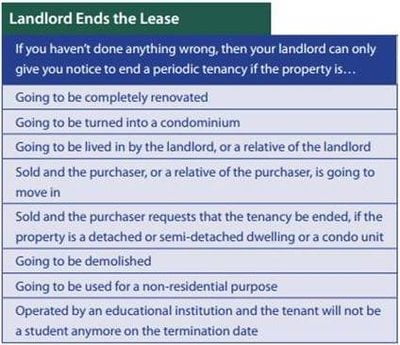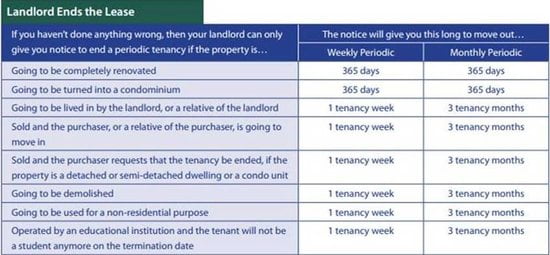 Can a landlord end a tenancy when the tenant has not done anything wrong? It depends. We’re going to look at some different factors that come into answering this question. Just so we’re all on the same page, today we’re talking about periodic tenancies, which are the kinds of tenancies that continue on indefinitely until either the landlord or the tenant give notice to end. The most common form of periodic tenancy is a month-to-month tenancy. There are no end dates in periodic tenancies.
Can a landlord end a tenancy when the tenant has not done anything wrong? It depends. We’re going to look at some different factors that come into answering this question. Just so we’re all on the same page, today we’re talking about periodic tenancies, which are the kinds of tenancies that continue on indefinitely until either the landlord or the tenant give notice to end. The most common form of periodic tenancy is a month-to-month tenancy. There are no end dates in periodic tenancies.
If a tenant receives a termination notice from the landlord, what should they do next? First, the tenant should look at the reason for the notice. Is the landlord giving the notice because the tenant has breached the agreement? For example, is the notice because the tenant hasn’t paid the rent? If the landlord’s reason is because the tenant has done something wrong, then it is an eviction notice. Our article What should you do if you get an eviction notice? provides for more information about this. Notice of Objection to an Evicition Notice
If the reason in the notice is not about the tenant having done something wrong, then the tenant should answer two different questions to find out if the termination is legal.
- Does the law say that the landlord can end the tenancy for the reason stated in the notice?
- If yes, then has the landlord provided enough notice?
Does the law say that the landlord can end the tenancy for the reason stated in the notice?
Each province has its own law which states the reasons that a landlord is allowed to terminate a periodic tenancy. Here’s a chart that shows the reasons that are allowed in Alberta.
The reason for termination is legal, but has the landlord provided enough notice?
There are requirements about how long the landlord has to provide the tenant to move out. The landlord must provide the full amount of notice. In Alberta, the amount of notice that a landlord must provide varies based on the reason that the landlord is terminating.
The notice seems to be legal. Does the tenant have to move?
Yes, usually the tenant will have to move. If the tenant needs more time to find somewhere to live, then the tenant should see if they can negotiate with the landlord. If the tenant doesn’t get the landlord’s consent to stay longer, and doesn’t move out, then the landlord can bring an application to force the tenant to vacate. The landlord will usually be able to keep the security deposit, and also apply for financial compensation from the tenant, if the tenant doesn’t move out on time.
The notice is not legal. What can the tenant do?
The tenant should respond to the faulty termination in writing, and tell the landlord they are not moving and the reasons why. The tenant should keep the notice that they got from the landlord, as well as a copy of the objection that they gave in response. The tenant should keep copies just in case they end up disputing the termination notice in court. If the tenant objects to the termination notice, but the landlord still wants the tenant to leave, then the landlord can either serve a new termination notice, or apply to terminate the tenancy in court.FAQ: What if the landlord does not give the proper amount of notice?
Where can the tenant go for help?
![]() This column was produced with the generous support of the Alberta Real Estate Foundation.
This column was produced with the generous support of the Alberta Real Estate Foundation.




